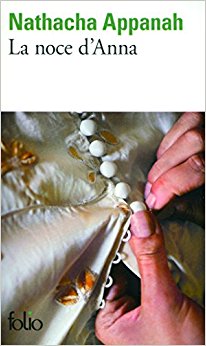
I’m still reading my way through the Man Booker International longlist, however, I am still making time to get through some other literary works. One of the authors I seem to turn to whenever I want something easy-to-read but compelling is Franco-Mauritian author Nathacha Appanah. I’ve already read three of her books: “Tropique de la violence”, “Les Rochers de poudre d’or” and “Blue Bay Palace”. “La Noce d’Anna”, the book I most recently picked up, is Nathacha Appanah book number four for me.
On this literary outing, Nathacha Appanah takes a more sentimental route. The book is simply about Sonja, a 42 year old woman witnessing the marriage of her daughter, Anna. The novel is narrated by Sonja, in the first-person, as she participates in the festivities slightly preceding and accompanying the wedding. Between wedding-related events, Sonja spends the entire novel reminiscing about her youth, about her life with Anna, about the perceived differences between herself and her daughter, about whether or not she made the right life choices, whether she lived enough, whether her daughter actually truly loved her, etc. etc….
I’m sure the novel will evoke a sentimental reaction from every woman of an adult-aged daughter. In that sense, I would say that the novel was successful, however, I do prefer Appanah’s more brutal, violent prose, as demonstrated in “Les Rochers…” and “Tropique de la violence”. My preference for Appanah’s other novels might also have something to do with the fact that I really did not like Sonja, nor did I even understand some of her life choices
*** SPOILER****
, i.e. not telling the man whom you claim to love and who loved you that you were pregnant with his child? How fair was that to Matthew or to Anna? Sleeping with the Father of the groom on the day of the wedding? (Does Sonja even imagine how this could destroy her relationship with the groom and Anna?)
Did anyone also wonder if Roman was actually Matthew? At the least, Roman seemed to be a Matthew-substitute, and a case of history repeating itself all over again for a woman who can apparently never extend beyond a one-night stand and tell her lover to stay…
I also felt that the visible minority Mother, Caucasian-looking daughter dynamic was far better written about by Marie Ndiaye in “LaDivine”.
Overall, a decent novel that was just a bit too unengaging and syrupy-sweet for me…
My final rating: ** (okay)
Advertisements Share this:




![Twice Bitten (Cascadia Wolves) by [Dane, Lauren]](/ai/054/028/54028.jpg)